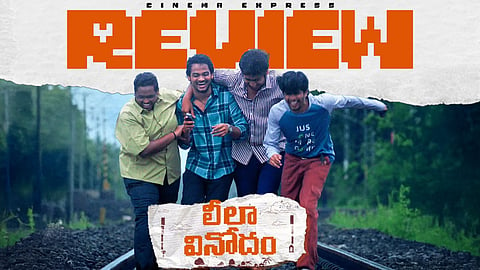Leela Vinodham review: All We Imagine as Love
Leela Vinodham(3.5 / 5)
There is a reason upcoming filmmakers often seek stories about childhood, teenage, and college days when pursuing their initial projects. It’s that one phase of life that everyone has lived with unbridled intensity, one chapter where every emotion is heightened, every fear seems insurmountable, yet nothing feels out of reach. Director Pavan Sunkara’s ETV Win original Leela Vinodham, captures that idyllic yet heightened phase with a lot of humour and heart.
The plot of Leela Vinodham rests on a razor-thin, one-liner premise—Prasad, a college passout waits for a reply from his beloved to his romantic proposal on an afternoon—and the film makes a great use of this premise, going along with its whimsical, wild potential. While it might look like a cutesy love story on the surface, the film is actually more of a tale about friendship. Everything Prasad imagines and assumes about his beloved Leela’s reaction and situation might or might not be based in reality, but his friends are, and their support is.
Director: Pavan Sunkara
Cast: Shanmukh Jaswanth, Anagha Ajith, Goparaju Ramana, Aamani, Rupa Lakshmi, Prasad Behara
Streaming on: ETV Win
Prasad, played by Shanmukh Jaswanth, is a textbook overthinker, and it seems director Pavan Sunkara is, too. The confidence in this claim comes from how effectively the director captures his protagonist’s inner life that centres around his overthinking, spiralling in anxiety and hyper-fixation. Early on in the film, the said conflict occurs as Prasad sends a text message to Leela (A charming Anagha Ajith), seated at his study table, and waits for the phone to chime. The phone is kept on the table, and there is nothing else to do. He twitches and flinches in his seat, before his mother reminds him that it’s been half an hour. This moment might feel alien to the current generation, but Pavan Sunkara adeptly captures that transition phase for the 90s kids, where they moved from landlines to cellular phones that were nonetheless limited in their possibilities. While mobile phones play a very crucial part in this film, it’s about the atmosphere that’s on display here — and Leela Vinodham takes you back to that era in totality – an era of floral-designed slambooks, magazine cutouts, landlines, and long spans where you can do nothing but wait.
Prasad imagines many hilarious situations that possibly explain Leela’s sudden absence, the most impressive of which is Leela’s parents reacting to their relationship. Prasad is comically hyper-active in his imagination, and his visualisation of Leela’s parents moving from reprimanding her to fixing a marriage alliance within minutes is one rib-tickling delight. There is another hilarious montage where Prasad is likened to a celebrity fan, being awarded medals for his relentless pursuit of Leela’s affections.
The film’s screenplay, also, is structured in a way that allows for plenty of playfulness and quirk, and Pavan Sunkara commits to the challenge. Be it the scene transitions or the way the director merges the worlds of imagination and reality, there is a lot of fun to be had here. As Prasad grapples with his feelings, we take a trip around the small town and meet its many quirky figures, who are fully fleshed people of their own (beautifully aided by the cinematography that captures the quietness of the little town and its landscapes). There is an amusing sequence with a shopkeeper with a penchant for memorising phone numbers, another with a naysaying friend who feeds on Prasad’s insecurities. Even the character of Prasad’s mother is beautifully established in a confrontation scene with him, where we learn she has her own set of problems.
Prasad is laughably anxious about finding reciprocation for his love, and the director suitably captures this phase with a heavy tinge of humour. The way Pavan edits his scenes too add to the humour quotient of his narrative. After a nerve-racking moment where Prasad anxiously picks up a call, underlined by a heavy background score, we swiftly cut to a calm, static moment of him taking notes for his mother from a client. The image of his diligent note-taking in the middle of his anxious waiting becomes is one to behold. At a duration of 98 minutes, the narrative is pacey, constantly moving and even unpredictable. The dilemma that Prasad finds himself in around 15-minute mark, stays alive well until the final act of the movie, and you are still not sure where the film is heading. That’s a nifty little achievement by the director.
However, the film’s biggest victory lies in how it never allows itself to get too flighty or flimsy — Underneath all the humour, there is a beating heart, and Pavan Sunkara keeps you emotionally invested in Prasad’s journey. The storytelling sticks to its amusingly self-introspective tone till the end, and that’s the best part of the film. At one point, one of Prasad’s friends questions him whether he has done any thing for Leela besides crushing on her. That’s the adorable, poignant thing about these coming-of-age tales — we must witness our protagonist indulge in plenty of immaturity and stupid things before we get to see them grow up.
Leela Vinodham is a heartwarming letter to the younger days, and the older times. Those who are stricken by the disease that’s called nostalgia, will especially dig this movie a lot. In all honesty, that includes your truly.

